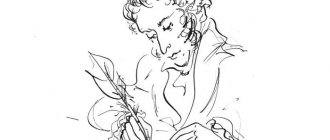Sonnet 23
As an unperfect actor on the stage, Who with his fear is put besides his part, Or some fierce thing replete with too much rage, Whose strength's abundance weakens his own heart; So I, for fear of trust, forget to say The perfect ceremony of love's rite, And in mine own love's strength seem to decay, O'ercharg'd with burden of mine own love's might. O, let my books be then the eloquence And dumb presagers of my speaking breast; Who plead for love, and look for recompense, More than that tongue that more hat more express'd. O, learn to read what silent love hath writ: To hear with eyes belongs to love's fine wit.
(William Shakespeare)
***
Like that actor who, timid, loses the thread of a long-familiar role, like that madman who, falling into anger, in an excess of strength loses his willpower, -
So I remain silent, not knowing what to say, Not because my heart has grown cold. No, my love, which has no limits, puts a seal on my lips.
So let the book speak to you. Let her, my silent intercessor, come to you with confession and prayer and demand fair retribution.
Will you read the words of silent love? Will you hear my voice with your eyes?
(William Shakespeare, translation by Samuil Marshak)
Sonnet 18
Shall I compare thee to a summer's day? Thou art more lovely and more temperate: Rough winds do shake the darling buds of May, And summer's lease hath all too short a date: Sometimes too hot the eye of heaven shines, And too often is his gold complexion dimm'd: And every fair from fair sometimes declines, By chance or natures changing course untrimm'd; By thy eternal summer shall not fade, Nor lose possession of that fair thou owest; Nor shall Death brag thou wander'st in his shade, When in eternal lines to time thou growest: So long as men can breathe or eyes can see, So long lives this and this gives life to thee.
(William Shakespeare)
***
Shall I compare your features to a summer day? But you are nicer, more moderate and more beautiful. The storm breaks the May flowers, And so our summer is short-lived!
Sometimes the heavenly eye blinds our eyes, sometimes the bright face is hidden by bad weather. Nature caresses, undead and torments us with its random whim.
And for you the day does not diminish, the sunny summer does not fade. And a mortal shadow will not hide you - You will live forever in the lines of the poet.
You will be among the living as long as your chest breathes and your eyes see.
(William Shakespeare, translation by Samuil Marshak)
Sonnet 102
My love is strengthened, though more weak in seeming; I love not less, though less the show appear. That love is merchandised whose rich esteeming The owner's tongue doth publish everywhere. Our love was new, and then but in the spring, When I was wont to greet it with my lays, As Philomel in summer's front doth sing, And stops his pipe in growth of riper days. Not that the summer is less pleasant now Than when her mournful hymns did hush the night, But that wild music burthens every bough, And sweets grown common lose their dear delight. Therefore, like her, I sometime hold my tongue, Because I would not dull you with my song.
(William Shakespeare)
***
I love, but I talk about it less often, I love more tenderly, but not for many eyes. The one who sells feelings is the one who puts his whole soul on display in front of the world.
I greeted you with a song, like a greeting, When love was new to us. So the nightingale thunders at midnight in the spring, but forgets the flute in the summer.
The night will not lose its charm, When its outpourings are silent. But music, sounding from all branches, Having become ordinary, loses its charm.
And I fell silent like a nightingale: I sang my own and sing no more.
(William Shakespeare, translation by Samuil Marshak)
Sonnet 37
As a decrepit father takes delight To see his active child do deeds of youth, So I, made lame by fortune's dearest spite, Take all my comfort of thy worth and truth. For whether beauty, birth, or wealth, or wit, Or any of these all, or all, or more, Entitled in thy parts do crownèd sit, I make my love engrafted to this store. So then I am not lame, poor, nor despised, While that shadow doth such substance give That I in thy abundance am sufficed, And by a part of all thy glory live. Look what is best, that best I wish in thee. This wish I have; then ten times happy me.
(William Shakespeare)
***
As the young courage of the heirs pleases the father in his declining days, So I admire your truth and glory, ingloriously fading.
Generosity, nobility, beauty, and a sharp mind, and strength, and health - Almost every feature of yours is conveyed to me with your love.
I am not poor, I am not weak, I am not alone, And the shadow of love that falls on me is carried by a stream of such bounty, That I live with one particle of it.
Everything I can wish for you Comes down from you like grace.
(William Shakespeare, translation by Samuil Marshak)
Sonnet 57
Being your slave, what should I do but tend Upon the hours and times of your desire? I have no precious time at all to spend, Nor services to do, till you require. Nor dare I chide the world-without-end hour While I, my sovereign, watch the clock for you, Nor think the bitterness of absence sour When you have bid your servant once adieu; Nor dare I question with my jealous thought Where you may be, or your affairs suppose, But, like a sad slave, stay and think of nought Save, where you are how happy you make those. So true a fool is love that in your will, Though you do any thing, he thinks no ill.
(William Shakespeare)
***
For faithful servants there is nothing else but to wait for the mistress at the door. So, ready to serve your whims, I spend my time waiting.
I don’t dare scold boredom in my head, watching the hands of your clock. I don’t curse the bitter separation, leaving your door at your sign.
I do not allow jealous thoughts to cross your cherished threshold, And, poor slave, I consider happy the One who could spend an hour with you.
Do whatever you want. I have lost my sight, And there is not a shadow of suspicion in me.
(William Shakespeare, translation by Samuil Marshak)
Sonnet 47
Betwixt mine eye and heart a league is taken, And each doth good turns now unto the other. When that mine eye is famished for a look, Or heart in love with sighs himself doth smother, With my love's picture then my eye doth feast And to the painted banquet bids my heart. Another time mine eye is my heart's guest, And in his thoughts of love doth share a part. So either by thy picture or my love, Thyself away are present still with me; For thou no farther than my thoughts canst move, And I am still with them, and they with thee; Or if they sleep, thy picture in my sight Awakes my heart to heart's and eye's delight.
(William Shakespeare)
***
The heart and the eye have a secret pact: They ease each other's torment, When the eye searches for you in vain And the heart suffocates in separation.
A keen eye allows your heart to admire your image to its heart’s content. And the heart yields its share to the eye at its appointed hour of love's dreams.
So in my thoughts or in the flesh You are before me at any moment. You can go no further than your thoughts. I am inseparable from her, she is inseparable from you.
My gaze draws you in my dreams and awakens the heart sleeping within me.
(William Shakespeare, translation by Samuil Marshak)
Sonnet 29
When, in disgrace with fortune and men's eyes, I all alone beweep my outcast state And trouble deaf heaven with my bootless cries And look upon myself and curse my fate, Wishing me like to one more rich in hope, Featured like him, like him with friends possess'd, Desiring this man's art and that man's scope, With what I most enjoy contented least; Yet in these thoughts myself almost despising, Haply I think on thee, and then my state, Like to the lark at break of day arising From sullen earth, sings hymns at heaven's gate; For thy sweet love remember'd such wealth brings That then I scorn to change my state with kings.
(William Shakespeare)
***
When at odds with the world and fate, Remembering years full of adversity, I disturb with fruitless prayer the deaf and indifferent firmament
And, complaining about the sad lot, I am ready to exchange my lot with the one who has succeeded more in art, is rich in hope and loved by people, -
Then, suddenly remembering you, I curse the pathetic cowardice, And like a lark, in spite of fate, My soul rushes to the heights.
With your love, with the memory of her, I am stronger than all the kings in the world.
(William Shakespeare, translation by Samuil Marshak)
Sonnet 116
Let me not to the marriage of true minds Admit impediments. Love is not love Which alters when it alteration finds, Or bends with the remover to remove. O no, it is an ever-fixed mark That looks on tempests and is never shaken; It is the star to every wand'ring bark, Whose worth's unknown, although his height be taken. Love's not time's fool, though rosy lips and cheeks Within his bending sickle's compass come: Love alters not with his brief hours and weeks, But bears it out even to the edge of doom. If this be an error and upon me proved, I never write, nor no man ever loved.
(William Shakespeare)
***
I do not intend to interfere with the connection of two hearts. Can betrayal put an end to immeasurable Love? Love knows no decline or decay.
Love is a beacon raised above the storm, not fading in the darkness and fog. Love is the star with which the sailor determines his place in the ocean.
Love is not a pathetic doll in the hands of Time, which erases the roses On fiery lips and on cheeks, And time’s threats are not afraid of it.
And if I am wrong and my poem lies, Then there is no love - and there are no my poems!
(William Shakespeare, translation by Samuil Marshak)
Sonnet 61
Is it thy will thy image should keep open My heavy eyelids to the weary night? Dost thou desire my slumbers should be broken, While shadows like to thee do mock my sight? Is it thy spirit that thou send'st from thee So far from home into my deeds to pry, To find out shames and idle hours in me, The scope and tenor of thy jealousy? O no; thy love, though much, is not so great. It is my love that keeps mine eye awake, Mine own true love that doth my rest defeat, To play the watchman ever for your sake. For thee watch I whilst thou dost wake elsewhére, From me far off, with others all too near.
(William Shakespeare)
***
Is it your fault that your sweet image does not allow me to close my eyelashes And, standing above my head, does not allow my heavy eyelids to close?
Does your soul come in silence to check my deeds and thoughts, to expose all the lies and idleness in me, to measure my whole life as my destiny?
Oh no, your love is not so strong as to appear at my head, My, my love knows no sleep. We stand guard with my love.
I cannot fall asleep while You are far from me and close to others.
(William Shakespeare, translation by Samuil Marshak)







